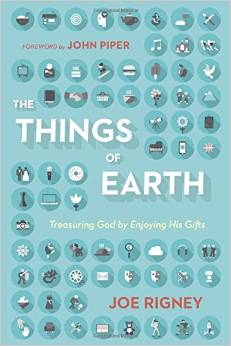I understand Christian hedonism. I mostly certainly do not always apply it to my life or implement a true recognition of joy the way that scripture points me to, but intellectually, it makes sense to me.
And, as always, C.S. Lewis’ words resonate:
If there lurks in most modern minds the notion that to desire our own good and to earnestly hope for the enjoyment of it is a bad thing, I suggest that this notion has crept in from Kant and the Stoics and is no part of the Christian faith. Indeed, if we consider the unblushing promises of reward and the staggering nature of the rewards promised in the Gospels, it would seem that our Lord finds our desires, not too strong, but too weak. We are half-hearted creatures, fooling around with drink and sex and ambition when infinite joy is offered us, like an ignorant child who wants to go on making mud pies in a slum because he cannot imagine what is meant by the offer of a holiday at the sea. We are far too easily pleased.
I want to enjoy God above all else. I understand the concept of His glory being the chief aim of my life, even though I certainly do not bear that out as I should. But it does leave me wondering about the things of this world and their place.
On the other hand, I can easily slide into both legalism and embrace a complete detachment from this world and all that is in it. I find that just one 1/2 step off the path of my existence, and can just as easily go down that trail as the one I am on. I can slip into a preachy attitude, judging all that this world offers (except my books, somehow those always escape my wrathful eyes) as unnecessary–a new car, new clothes, an “upgrade” of any sort. I’m particularly prone to dismiss things of leisure–a vacation, or an afternoon wandering a trail in a park, or spending an hour listening to quality music.
There is, after all, work to be done.
When I first had a conversation with someone at Crossway Publishing about reviewing Joe Rigney’s The Things of the Earth, I was struck by her comment to me–that reading this book had, literally, made her enjoy more the honey in her tea.
I understand her words better now.
Rigney has done a great service to Christ-follower thought by providing a balance of some sort to the body of work that encompasses the idea of Christian hedonism, first coined by John Piper in his 1986 book: Desiring God. Piper’s words and exposition of scripture there have helped foster a much-needed view of the primacy of joy–joy that is placed solely in God.
But what do we do with the “stuff” that makes up our days? With the sky, a slice of cheesecake, a good work of fiction? With a well-earned paycheck, and a beach-scented candle, and the beach itself? What do we do with the gifts that are our children, our neighbors, our church family? How about an uninterrupted night’s sleep? Surely these come from God as well as the core things such as salvation and forgiveness and justification and sanctification. Is there no place for these “things” in our life?
Rigney says that there is, and that God intends for us to enjoy these things–to savor them, appreciate them, relish in them, with a perspective that wraps these gifts in James 1:17:
And, the wonder that is contained in Luke 11, immediately following the Lord’s Prayer. The Father gives good gifts. My Father gives good gifts.
But, what happens when those gifts are taken away? What happens when the good gift of a spouse, or house, or job, or child, or health, is taken?Rigney addresses this, too, in ways that I hadn’t considered before. And he reminds us as he wraps up his thoughts in the last chapter, that all we have is Christ.
All you have is Christ,
- whether you have him in all the good gifts that he lavishes on you;
- or whether you have him in all the gifts that you gladly receive and then freely give away in the cause of love
- or whether you only have him in the loss of everything else that is precious to you.
(emphasis and underlining mine)
JOE RIGNEY. The Things of Earth: Treasuring God by Enjoying His Gifts. Crossway.
I am grateful to have received a review copy of this book from Crossway Publishers


